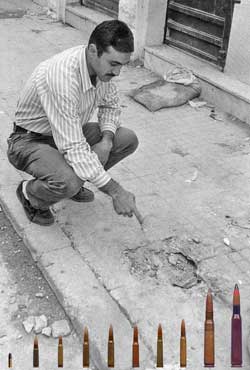Filling history's gaps with art

Walid Raad, We Can Make Rain But No One Came To Ask, 2005
Great gaps remain when only official records are used to reconstruct a war. Walid Raad says art that reflects personal experiences can help fill the void.
Raad held a conference Jan. 25 to open his exhibit at Concordia’s Leonard and Bina Ellen Gallery, We Can Make Rain But No One Came To Ask: Documents from the Atlas Group Archive.
Raad is the founder of the Atlas Group, a collective that seeks to chronicle the history of modern Lebanon – particularly the effects of the Lebanese civil war – through its collection of thousands of items such as notebooks, photographs, videos and sculptures.
When it was formed in 1999, one of the Group’s first projects was to document all 3,641 car bombs that exploded in Beirut during the war from 1975-1995. At the time, they didn’t realize those detonations were just the beginning: They predated others in the Middle East, as well as in cities such as Madrid and London.
“We thought we were talking about Lebanon in the past, but it turns out we were talking not only about Lebanon, but the United States, Europe and Baghdad in the future,” Raad said.
Raad grew up in Lebanon and is an assistant professor of art at Cooper Union in New York City. The Atlas Archives are located in that city and in Beirut, Lebanon.
“We seem to find documents that are historical symptoms, and we unpack them to find their meanings … to create a place in the universe where the document makes sense.
"It’s a shift from facts being hidden to being available in the form of data.”
For example, the archives might indicate how many of the cars used were red. They also show the size of the crater, the perimeter of destruction and other details.
These are recorded in the notebooks of Raad’s fictitious Leb-anese historian, Dr. Fadl Fakhouri. He “bequeathed” more than 225 notebooks, a series of self-portaits and two short films to the archives.
Wherever he went, Fakhouri carried two Super-8 film cameras with him. He exposed one frame at a time on the appropriate camera on two specific occasions: each time he thought the war had ended, or whenever he passed a doctor or dentist’s office.
If you blink, you risk missing much of Miraculous Beginnings and No, Illness is Neither Here Nor There.
Raad has created several fictional characters to peel back conventional historical layers to reveal multiple meanings and interpretations of past experiences.
For example, the video “testimony” of Souheil Bachar in The Bachar Tapes explores the psychological, cultural and homoerotic aspects of confinement from a non-western point of view, and is allegedly based on the experience of an actual Arab man who was briefly confined with five Americans during the western hostage crisis in the mid-80s.
Raad said it was important to tell his story because it represents a non-Western perspective on the crisis. Just like history, Raad said, “Every man experiences captivity in his own way.”
The exhibit runs until March 4. For more information, consult What’s On.